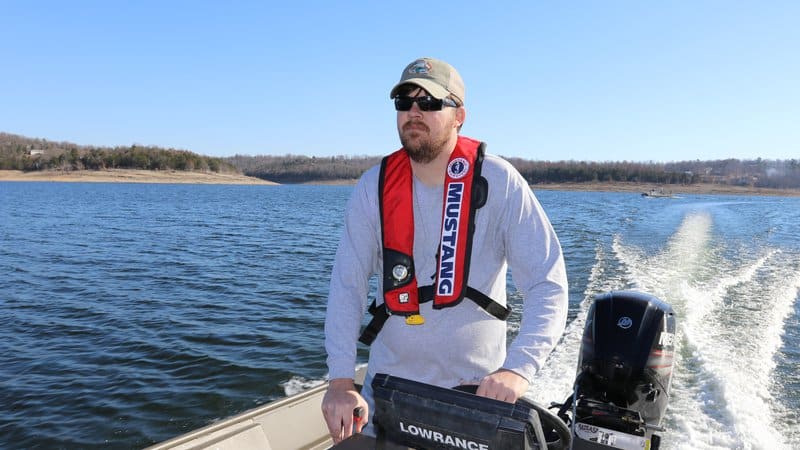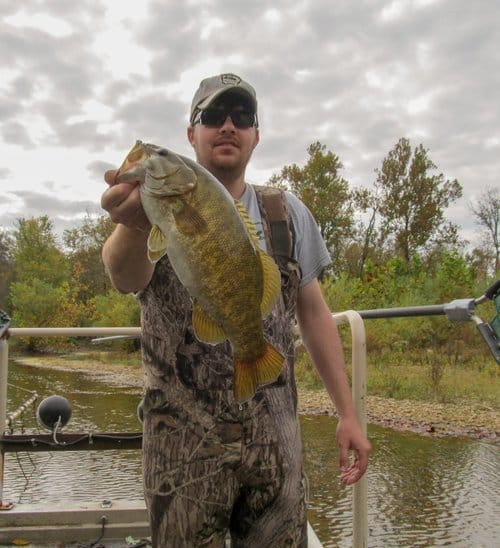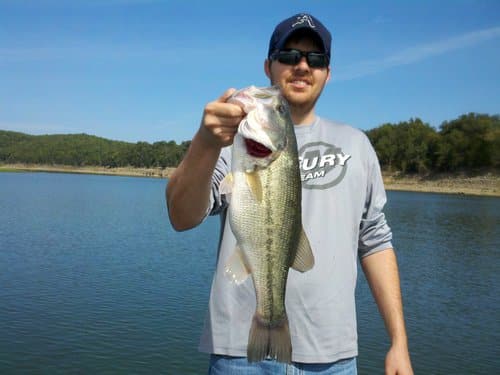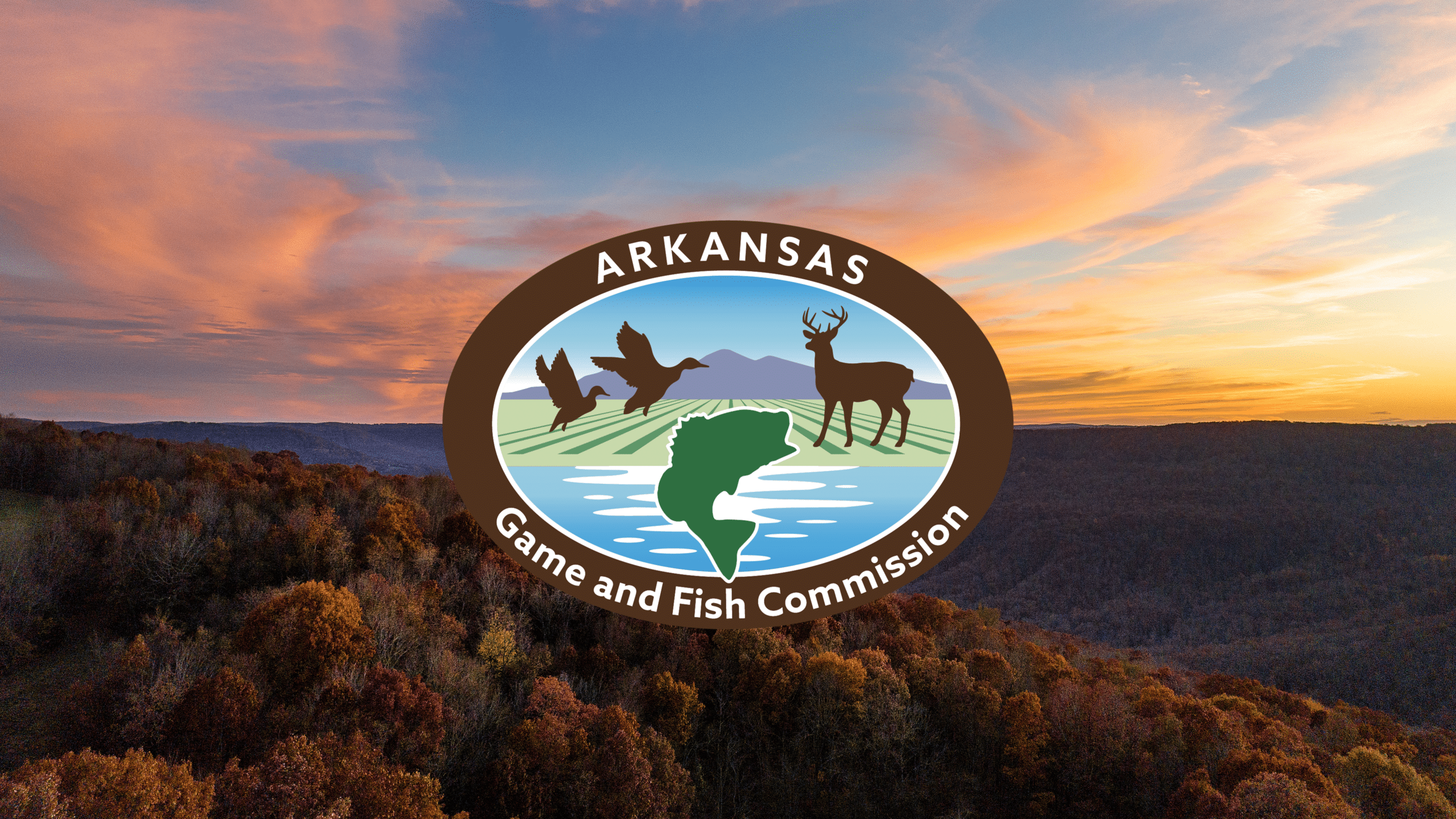AGFC’s Jeremy Risley moves into black bass program coordinator role
BY Jim Harris
ON 04-19-2023

April 19, 2023
Jim Harris
Managing Editor Arkansas Wildlife Magazine
LITTLE ROCK – Jeremy Risley is well known within the Arkansas Game and Fish Commission’s Fisheries Division as well as among bass anglers around the state as an avid angler. He started tournament bass fishing at age 12 and was part of a bass club at age 16. He even recounts fishing in 29 events in one year while working in Monticello a few years back. Marriage and a child may have cut into his hobby in recent years, but Risley still describes himself as a “hardcore bass angler. That’s all I’ve known all my life.”
With 20 years at the AGFC, including the last 18 as a fisheries biologist, the Mountain Home native is moving into the role as black bass program coordinator.
“It’s a mix of excitement and nervousness,” the 42-year-old Risley says of the move, “the nervousness being more of just change. I have a routine, and things are going to be different now. It’s just kind of the unknown.”
But what Risley is stepping into isn’t too unknown to him. He worked with Vic DiCenzo, the AGFC’s assistant chief for fisheries management and the previous black bass program coordinator, on the AGFC’s new, 10-year reservoir black bass management plan, and he has that strategic plan in front of him for a roadmap.

“(Bass fishing) is his passion,” DiCenzo says of Risley. “I’ve known him since right before I started in 2021. Jeremy’s got those plans that will help guide what needs to be done. He was a member of the black bass team that helped write that plan, so he was with me through the process of developing that reservoir plan.”
AGFC fisheries chief Jason Olive said, “Jeremy has his goals, objectives and strategies laid out for him, and there’s a lot of things that are new, innovative and different that we haven’t done in the past that will be up to Jeremy to spearhead those new initiatives.”
Risley worked in offices at Russellville, Monticello and Jonesboro, as well as in his hometown, where he’ll be able to run the black bass program.
“I’ve either sampled or fished in every district in Arkansas for bass,” he says, adding that he and Frank Leone, the AGFC’s district supervisor in Russellville, have fished in tournaments all over the state. “I’ve fished all of the major reservoirs and the Arkansas River.”
All that bass angling, he says, has been his hobby and “in the past, I’ve tried to keep it separated from hobby and work, but now the hobby is work.” It’s in his blood: His grandfather guided on Bull Shoals Lake as a bass angler, Risley said, and his father has fished as a bass angler all his life as well.
As the fourth coordinator in the black bass program’s 23-year history, Risley hopes to continue being a bridge between anglers and the agency. Thanks to focus groups, industry summits and modern outreach tools, communication between AGFC fisheries biologists and the public is at an all-time high, and Risley is ready to step into that role.
“I want to be that middle man that helps the agency and the bass anglers work together for the betterment of bass fishing in Arkansas,” Risley said.
Risley’s tournament activities have allowed him to meet anglers from one end of the state to the other, says Olive, who arrived at the AGFC just before Risley did. They worked together several years back in neighboring south Arkansas fisheries districts.
“Jeremy is well-traveled, he’s well-connected with the avid anglers in all different parts of the state,” Olive said. “He’s well-known in the Arkansas bass angling community, and we think that’s going to be a positive, somebody they already know and trust and consider one of their own, so to speak.”

But, Olive adds, the black bass program coordinator will have more on his plate than just meeting with anglers and fielding their questions or concerns. “Jeremy’s a very capable biologist as well. He knows the importance of habitat, of having quality bass fisheries, and he’s done as much habitat work on Bull Shoals and Norfork, which have been his two lakes (in the AGFC’s Mountain Home Office), as anyone has done on any lake in the state.”
Risley says he’s worked either full time or part time with all the AGFC black bass biologists in his time at the agency. He graduated from Arkansas Tech University with a degree in fish and wildlife and earned his master’s in biology at Missouri State University, where he researched the growth of spotted bass in Beaver, Bull Shoals and Table Rock lakes.
“So, you can see a pattern here,” he added with a laugh. “A lot of my career has been around bass.”
Olive said, “He has an incredible work ethic. He did a great job managing walleye (at his district position at Mountain Home), he did a good job managing crappie up there as well as other species, but at the end of the day it’s bass that gets him excited. He’s just going to go all out when it comes to bass management.”
Olive and DiCenzo also noted Risley’s knowledge of black bass beyond Arkansas’s borders. He’s well-versed, they say, in what is going on in neighboring states and other states throughout the southeast, and that will pay off for the management of black bass in The Natural State.
“Having that knowledge and experience and a network of bass biologists around the Southeast is extremely valuable as well,” said Olive, who also marvels at Risley’s ability to recount what angler won a certain bass tournament, and how they won it, years ago at, for instance, Sam Rayburn Lake in Texas.
“Having that broad understanding of regional differences will help him communicate with our anglers on why we’re doing certain things,” Olive said. ”A lot of us are good at telling our anglers what we’re doing, how we’re doing it. But oftentimes this missing component is why, and anglers want to know why are you doing it this way, or they perceive someone else is doing something a certain way, and they want to know why. Jeremy has a good ability to answer those questions and tell people, ‘Here is why AGFC is doing this or that related to bass management. Or, here’s why that worked in a lake in west Texas in the desert and why it wouldn’t work in Arkansas.’”

The AGFC’s black bass program includes a full-time assistant that Risley will hire. DiCenzo says the AGFC is unique among state agencies in its focus on black bass. “I’m not aware (elsewhere) of a team of people dedicated solely to black bass management. It usually falls on district staff, and some states have research staffs, too.”
Also, as Olive notes, the rest of the fisheries division, outside of the AGFC’s four-person full-time trout management team, devotes a large chunk of their work time to black bass.
Risley said his immediate focus will be the continued work on gaining a better understanding of genetics of the state’s black bass. DiCenzo, who finalized a draft of the AGFC’s stream smallmouth management plan and led a very public-intensive development of the reservoir management plans in his two years as black bass program coordinator, said the agency has contracted with the University of Arkansas for a statewide genetics study on smallmouth bass.
DiCenzo says the black bass coordinator “wears a lot of hats.” Within the agency, the coordinator serves as scientific research support for district fisheries staff, whether that is keeping up with recent research across the country, leading research ideas, helping to identify salient topics that need to be addressed, supporting habitat work, or assisting with field work on occasion. Externally, it is the connection with stakeholders “that is just so paramount to success in this position,” he said. “A lot of the objectives in that reservoir black bass management plan are outward facing, and they’re going to require continued connections with stakeholders across the state.”
Risley is ready to hit the ground running, with at least two hats already in hand, as angler and as biologist. “I’m looking forward to meeting anglers on the water, in the tournament weigh-in line or in meetings around the state,” he said.
Dicenzo said, “He’ll do an excellent job. Given his scientific background, given his passion for black bass and given his connections with the fishing community, Jeremy is set up for success in leading the program.”
####
CUTLINES:
Risley driving boat
AGFC Black Bass Program Coordinator Jeremy Risley heads out to supervise Bull Shoals habitat project.
Holding trophies
Risley and fishing partner, Brandon Carter, at the 2017 Casting for Kids Bass Classic on Norfork Lake.
Risley in green waders with fish
Risley has worked with all of Arkansas’s native bass species during his time at the AGFC, including smallmouth.
Risley on boat with fish
Risely will combine his passion for black bass angling with scientific knowledge to continue moving Arkansas forward in the fishing community.
Recent News

Schoenrock chosen to lead AGFC
Apr. 21, 2025

AGFC Commissioner Meeting Notice
Apr. 21, 2025
Subscribe to Our Weekly Newsletter E-mails
Don’t miss another issue. Sign up now to receive the AGFC Wildlife Weekly Newsletter in your mailbox every Wednesday afternoon (Waterfowl Reports are published weekly during waterfowl season and periodically outside the season). Fishing Reports arrive on Thursdays. Fill in the following fields and hit submit. Thanks, and welcome!
